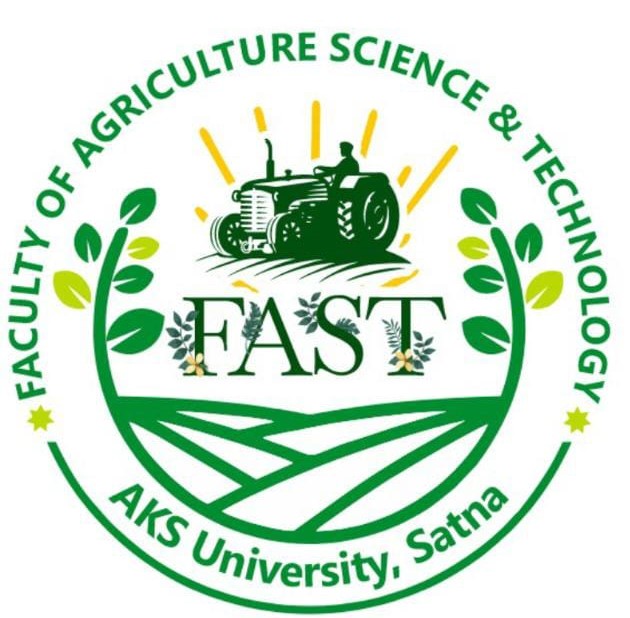Department of Genetics & Plant Breeding
About the Department
Vision
Mission
HOD's Desk
Graduate Attributes (GA)
About the Department
Overview of the Department
The Department of Genetics and Plant Breeding at AKS University, Satna, is dedicated to excellence in agricultural education, research, and innovation. The department focuses on imparting in-depth knowledge of genetics, crop improvement, and modern breeding techniques. With a blend of experienced faculty, well-equipped laboratories, and advanced research facilities, it provides a strong foundation for students to excel in both academic and practical aspects of plant breeding. The department also encourages student involvement in research projects, field trials, and industry interactions to prepare them for future challenges in agriculture and allied fields
Achieving Milestones by Implementing NEP-2020
The Department of Genetics and Plant Breeding has successfully aligned its academic and research practices with the vision of the National Education Policy (NEP) 2020 by:-
- Adopting a multidisciplinary.
- Flexible, and student-centric approach.
- The department has enhanced skill-based learning
- Introduced outcome-oriented curricula.
- Encouraged research and innovation.
- Emphasis on practical exposure.
- Internships, and holistic development has empowered students to meet global agricultural challenges.
Vision
Vision
To impart quality education and research in field of the Genetics and Plant Breeding in UG, PG and Ph. D Programme and develop high yielding crop varieties with biotic and abiotic stress resistance, climate resilient and high quality research in this department.

Mission
Mission
- To impart quality teaching in genetics and plant breeding related subject in UG, PG and Ph. D programme.
- To promote abilities of lifelong learning quality research to M. Sc and Ph. D students in the field of Genetics.
- Implement updated outcome-based curricula (OBE), develop graduated attributes among all UG, PG and Ph. D Students and create student centric teaching and learning environment.
- To collect, evaluate, maintain and characterize the genetic resources of field crops.
HOD's Desk
Dr. Brindaban Singh
M.Sc. (Ag) in GPB, Ph.D. in Genetics & Plant Breeding, MGCGPV, Chitrakoot
Head of the DepartmentDepartment of Genetics and Plant BreedingAKS University, Satna (M.P.) India – 485001

Message
It is my privilege to extend warm greetings to all students, researchers, faculty members, and visitors exploring our department. As the Head of the Department, I take immense pride in our commitment to academic excellence, innovative research, and societal contribution through agricultural advancements.
Our department plays a pivotal role in developing climate-resilient, high-yielding, and nutritionally enriched crop varieties. With a focus on both classical and molecular breeding approaches, we aim to address global challenges such as food security, environmental sustainability, and the impact of climate change on agriculture.
We offer a dynamic academic environment that nurtures curiosity, encourages innovation, and promotes interdisciplinary collaboration. Our faculty members are deeply engaged in cutting-edge research and dedicated to mentoring the next generation of scientists and agricultural leaders.
I invite you to explore the various programs, research activities, and achievements of our department. We are always open to collaborations and partnerships that can help advance the frontiers of plant science and breeding for the benefit of society.
Thank you for visiting our page, and we look forward to your continued interest and support.
Warm regards,
Our department plays a pivotal role in developing climate-resilient, high-yielding, and nutritionally enriched crop varieties. With a focus on both classical and molecular breeding approaches, we aim to address global challenges such as food security, environmental sustainability, and the impact of climate change on agriculture.
We offer a dynamic academic environment that nurtures curiosity, encourages innovation, and promotes interdisciplinary collaboration. Our faculty members are deeply engaged in cutting-edge research and dedicated to mentoring the next generation of scientists and agricultural leaders.
I invite you to explore the various programs, research activities, and achievements of our department. We are always open to collaborations and partnerships that can help advance the frontiers of plant science and breeding for the benefit of society.
Thank you for visiting our page, and we look forward to your continued interest and support.
Warm regards,
Graduate Attributes (GA)
Graduate Attributes (GA)
The postgraduate programs in the Department of Genetics and Plant Breeding are designed to develop a comprehensive skill set and professional competencies in students, preparing them for advanced research, teaching, and leadership roles in agriculture and allied sectors. Our graduates are expected to demonstrate the following attributes:
1. Deep Disciplinary Knowledge: Proficient understanding of genetics, plant breeding, biotechnology, and related fields, with the ability to apply this knowledge in practical and research settings.
2. Research and Analytical Skills: Ability to design, conduct, and interpret scientific experiments and field trials using appropriate methodologies, tools, and statistical techniques.
3. Innovative Problem-Solving: Capacity to identify agricultural challenges and develop effective, sustainable, and innovative breeding strategies and solutions.
4. Technical Proficiency: Hands-on experience with advanced breeding tools and technologies including molecular markers, genomic selection, and bioinformatics applications.
5. Effective Communication: Ability to communicate scientific knowledge clearly and effectively through written, oral, and digital formats to both scientific and non-scientific audiences.
6. Ethics and Professionalism: Commitment to ethical research practices, environmental sustainability, and the socio-economic responsibilities of a plant breeder.
7. Teamwork and Leadership: Competence in working collaboratively in interdisciplinary teams and displaying leadership in research, academia, or industry settings.
8. Lifelong Learning and Adaptability: Enthusiasm for continuous learning and the capacity to adapt to emerging technologies, trends, and challenges in agricultural science.
9. Global and Societal Awareness: Understanding of the broader implications of plant breeding on global food security, biodiversity, climate resilience, and rural livelihoods.
1. Deep Disciplinary Knowledge: Proficient understanding of genetics, plant breeding, biotechnology, and related fields, with the ability to apply this knowledge in practical and research settings.
2. Research and Analytical Skills: Ability to design, conduct, and interpret scientific experiments and field trials using appropriate methodologies, tools, and statistical techniques.
3. Innovative Problem-Solving: Capacity to identify agricultural challenges and develop effective, sustainable, and innovative breeding strategies and solutions.
4. Technical Proficiency: Hands-on experience with advanced breeding tools and technologies including molecular markers, genomic selection, and bioinformatics applications.
5. Effective Communication: Ability to communicate scientific knowledge clearly and effectively through written, oral, and digital formats to both scientific and non-scientific audiences.
6. Ethics and Professionalism: Commitment to ethical research practices, environmental sustainability, and the socio-economic responsibilities of a plant breeder.
7. Teamwork and Leadership: Competence in working collaboratively in interdisciplinary teams and displaying leadership in research, academia, or industry settings.
8. Lifelong Learning and Adaptability: Enthusiasm for continuous learning and the capacity to adapt to emerging technologies, trends, and challenges in agricultural science.
9. Global and Societal Awareness: Understanding of the broader implications of plant breeding on global food security, biodiversity, climate resilience, and rural livelihoods.

